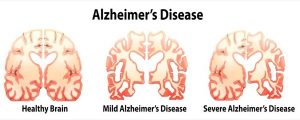Being that this month, November, is National Alzheimer’s Disease Awareness Month, it only seems to fitting to talk about a recent breakthrough that is trying to fight against the disease. Alzheimer’s is a type of dementia that causes memory loss in people that are affected. The majority of those that are affected are 65 years old and greater, and the disease only gets worse in the years after the disease develops (Alzheimer’s Association). This is a disease that affects many people with 5.4 million people diagnosed in America. One recent finding, from Dr. Karen Ashe at the University of Minnesota, has provided results that reversed memory loss in mice.

Above is a figure showing how the brain deteriorates by Alzheimer’s disease.
(U.S. National Library of Medicine)
According to the StarTribune, Dr. Ashe is “a world-renowned expert on Alzheimer’s disease.” Ashe and her team of researchers have previously found ways to reverse memory loss. In 2005, they found some success by turning off a gene that caused tangles in the brain that are associated with Alzheimer’s disease. Their recent study, published in 2016, expands off of that finding, as they targeted a protein called tau (StarTribune). The researchers found a correlation between the protein tau being cleaved by an enzyme called caspase-2 and dementia. So, in their recent study, Ashe and company reduced the levels of caspase-2 in mice to test if the enzyme was a key factor in memory loss. It turns out that the experiment was a success, as the results showed a decrease in the enzyme allowed the brain to repair itself and reverse memory loss (Nature Medicine).

Dr. Karen Ashe successfully found a way to reverse memory loss caused by Alzheimer’s disease. (StarTribune)
These results are not a cure for alzheimer’s but it is a step in the right direction. This is encouraging as it shows that scientists are building off of past findings and do not want to be complacent with just finding a way to cure alzheimer’s disease but rather would like to prevent it. Just like with other treatments and medicines, this study’s reduction of caspase-2 needed to be studied on animals first, before it can be applied to humans. Now that Dr. Ashe had success in reversing memory loss in mice, she has gained the support of doctors to assist her in making sure that the treatment will work in humans as well as finding a way to easily to treat those diagnosed with the disease (Nature Medicine). Breakthroughs like this one, by Dr. Ashe, provide hope that we will soon find a cure for alzheimer’s, a disease that affects so many.
References:
Genetics Home Reference. 2016. Alzheimer Disease. [Internet] U.S. National Library of Medicine (US); [cited 2016 Nov 7] Available from https://ghr.nlm.nih.gov/condition/alzheimer-disease
Alzheimer’s researchers at University of Minnesota reverse memory loss in mice. [Internet]. StarTribune (US); 2016 [cited 2016 Nov 6] Available from http://www.startribune.com/alzheimer-s-researchers-at-university-of-minnesota-reverse-memory-loss-in-mice/396739231/
Caspase-2 cleavage of tau reversibly impairs memory. [Internet]. Nature Medicine; 2016 [cited 2016 Nov 6] Available from http://palgrave.nature.com/nm/journal/vaop/ncurrent/full/nm.4199.html
What is Alzheimer’s? [Internet]. Alzheimer’s Association (US); 2016 [cited 2016 Nov 6] Available from http://www.alz.org/alzheimers_disease_what_is_alzheimers.asp
That’s really cool!
I mostly just wanted to say that, but do they know about any potential side effects yet? Or what the purpose of the gene in question is?
This was a very interesting post! Alzheimer’s affects so many people and there is not a very good treatment for it, so it’s encouraging that this new research is going well. How did they reduce the levels of caspase-2 in the mice?
This is such great news for those of us who have families affected by this disease. It would be great to have some clickable links to further information.
This is awesome news! I know that Alzheimers forms protein plaques on the brain, and I wonder if this reduction of the enzyme, and the brain repairing itself, result in a decrease in plaque size or presence?